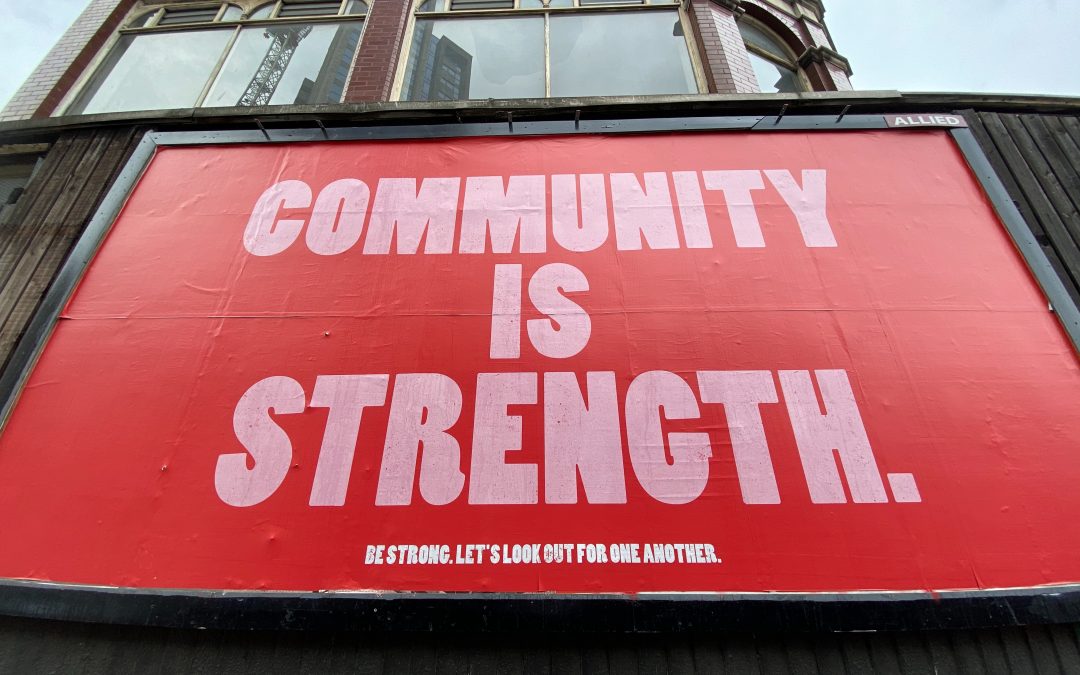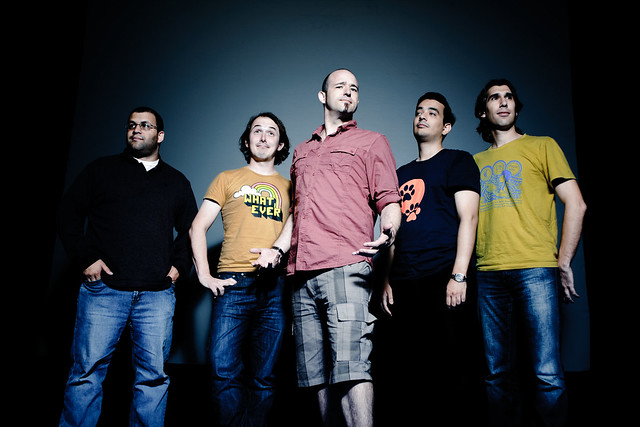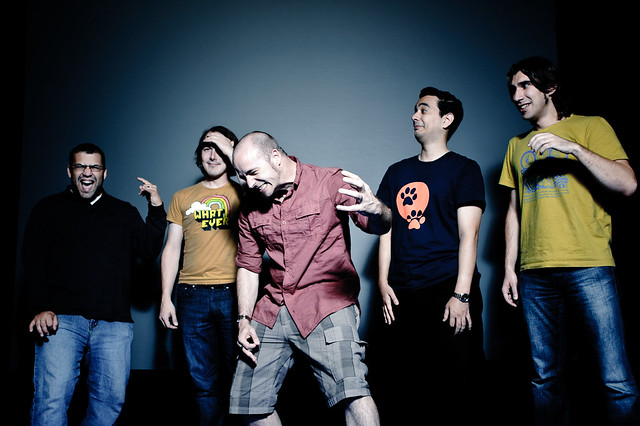
Thunderbird In Ubuntu 11.10
I am an Evolution user. While people seem to rag on Evo, I quite like it. In Oneiric though there has been discussion about switching to Thunderbird. I have always been a firm believer in *eating your own dogfood* where possible, so I decided to start using Thunderbird this week when I upgraded to Oneiric.
Overall everything is looking good so far, but I wanted to summarize some feedback about Thunderbird, as well as some news about Thunderbird’s integration into Ubuntu.
## Feedback
Overall I like Thunderbird. I used to be a Thunderbird user but moved away due to better desktop integration in Evolution. Some initial feedback:
* Thunderbird now integrates with the Messaging Menu and the Unity launcher. At first this didn’t work, but with a bit of debugging help from *Chris Coulson* (the legend who is doing a lot of this integration work), he found the bug and rolled a fix which will land in Oneiric shortly. If this didn’t work for you, it should work when you upgrade your Oneiric.
* I *cannot stand* the Global Search. It doesn’t ever net usable results. As an example, I did a search for *Andy Oram* today, who I have been chatting with recently, and I clicked to sort the results by *date*. It didn’t find the thread from the last few days, which was not good. It turns out there are really two search paths: the Global Search, and the search for filtering the messages, which acts like a more traditional email search like the one in Evolution. If this Global Search is not improved, I would recommend it be switched off in the default Thunderbird installation in Ubuntu ([bug report](https://bugs.launchpad.net/ubuntu/+source/thunderbird/+bug/810763))
* When sending a message a window pops up to say the message is being sent – this is pretty distracting and interrupts the flow of working with your email ([bug report](https://bugs.launchpad.net/ubuntu/+source/thunderbird/+bug/810769)).
* Fonts seem too small (particularly the message font) and there are also still some quirks when it comes to configuring fonts and Thunderbird remembering what you configured ([bug report](https://bugs.launchpad.net/ubuntu/+source/thunderbird/+bug/810773)).
* The notifications integration is nice and shows you a little about what message arrived. It is also nice to not see that hulking great big Thunderbird notification appear in the lower right-hand corner. 🙂
## Coming Work
I talked to Chris today about some of the future work and missing integration pieces. Here are some of the goals:
* Work is going on to integrate the Lightning extension for calendar integration into Thunderbird. This will bring the feature-set more on par with Evolution. Last time I tried Lightning it was quite young in it’s development, so I am keen to see how this works.
* Chris is working on the Evolution Data Server integration; this would provide better integration into the desktop, so for example, you events will appear in calendar indicator.
* Thunderbird looks less integrated today at a theming level, but Chris showed me some of the mock-ups for theming improvments being worked on by Andreas:

* Overlay Scrollbar support is on the *nice-to-have* list for the 11.10 release. IF you are interested in helping with this, do let me know.
Overall, things are looking good and with these integration components complete, the Thunderbird experience should be pretty rocking in Ubuntu. I can’t wait to see it evolve over the coming months!

QA Community Coordinator Required
I am looking to hire a new member for my team (the *Community Team*) here at [Canonical](https://www.canonical.com). I am looking for a bright, motivated, and experienced person **to build, maintain and develop a cohesive, productive and effective Ubuntu QA community**.
This role will be full-time working at Canonical, you will be working from home with regular travel to various events (such as UDS and team sprints), and you will be working in a fast-paced, productive, and energetic environment. This is a really exciting role that is designed to bring huge value to the Ubuntu community in the area of quality by refining, optimizing, and growing our QA community participation.
Key responsibilities and accountabilities:
* Build and maintain a strong, consistent, and consolidated QA community and to act as a point of reference for this community in continuing its growth and opportunities, and resolving issues.
* Maintain a set of online resources, produce content for those resources and build community participation to generate and optimize content for and from the community.
* Develop and refine better working practises to ease and improve how community members and stakeholders interact with the Ubuntu QA team.
* Liaise with the Canonical Ubuntu Platform Team to better align the direction of the Ubuntu QA community with internal QA needs and workflow.
* Regularly acquire and evaluate feedback from the community and our partners to help improve Ubuntu QA.
* Be responsive and sensitive to the concerns, ambitions and direction of the community, our upstreams and business units inside Canonical.
Required skills and experience
* Strong QA skills and experience, strong networking and social networking skills, good relationship building abilities, process driven, able to manage multiple work streams, good prioritisation, independent, willing to travel potentially 25% of their work time, able to resolve conflict, able to communicate well in written form and produce electronic content.
* Experience of working with community Open Source projects, technical experience with QA technologies and workflows.
* Have strong social skills, a good networker and a good technical knowledge of Ubuntu, Power and the Open Source and upstream/downstream development process. Candidates should be process driven, strategically minded and committed. Good public speaking skills a bonus.
* Candidates should provide evidence of existing experience and work in the Open Source community and suitable references.
## How To Apply
To apply, see the [job description](https://tbe.taleo.net/NA3/ats/careers/requisition.jsp?org=CANONICAL&cws=1&rid=245) and apply using the *apply for this Position* button.
Please don’t send me your resume directly; if you use the system it makes it much easier for me to track all the applications.
Good luck!

Community Leadership Summit 2011 – A Few Weeks Away!

Not long now until the [Community Leadership Summit 2011](https://www.communityleadershipsummit.com/); an annual event designed to bring together community leaders and managers to share best practice, ideas, and solutions. The event is entirely **free** and takes place from **23rd – 24th July 2011** in **Portland, Oregon**. The event takes place the weekend immediately before [OSCON](https://www.oscon.com/oscon2011) in the same venue, the **Oregon Convention Center**.
To join us you need to register, and over **260** people have already registered from a [diverse range of organizations](https://www.communityleadershipsummit.com/attendees/) including *Mozilla, O’Reilly Media, Rackspace, Adobe, Partimus, Red Hat, Google, Portland State University, Open Affairs Television, Apache Software Foundation, Xen, Digium, IBM, Microsoft, CloudCamp, OpenSesame, Oregon State University Open Source Lab, Wikia, Eucalytpus, MySQL, MeeGo, Linaro, Oracle, Linux New Media, BitNami, SUSE, setiQuest, Webtrends, Alfresco, Northeast Coalition of Neighborhoods, Open Source Bridge, OpenStack, Joomla!, Peace Markets, Infinity Curve, MoreThanGiving.com, TYPO3 Association*, and many more.

Awesome people having a rocking time and building stonking communities. What’s not to love?
If you are interested in community and building great community for your organization or project, be sure to come and join us. The event is an unconference, and as such the content and topics are driven by the attendees, which has resulted in a rich set of content and great best practice shared across many different disciplines.
I also want to offer my thanks to [O’Reilly](https://oreilly.com/), [Oracle](https://www.oracle.com/), [OpenStack](https://www.openstack.org/), [Ohloh](https://www.ohloh.net/), and [Microsoft](https://www.microsoft.com/) for helping to support the event!
Interesting In Coming? Simple. Just go and [register](https://www.communityleadershipsummit.com/register/) (it is **free**) and feel free to [share some session ideas](https://communityleadershipsummit.wikia.com/wiki/2011/SessionIdeas) that you may want to see or run at CLS11.
## Scheduling Sessions
The CLS is an unconference, meaning everyone is welcome to volunteer a session while there. We start with a blank slate and then the audience put sessions up.
Thanks to our generous sponsors, **everyone who runs a session will get a free copy of my book, [The Art of Community](https://www.artofcommunityonline.org/)** as a thankyou for running a session.
If you are interested in running a session, we would love to see you plan your session with other attendees. To do go to the [CLS11 Wiki](https://communityleadershipsummit.wikia.com/wiki/Community_Leadership_Summit_Wiki) and share [session ideas](https://communityleadershipsummit.wikia.com/wiki/2011/SessionIdeas) and [lightning talks](https://communityleadershipsummit.wikia.com/wiki/2011/Lighting_Talks) for the event. Everyone is welcome to share ideas!
## Spreading The Word
CLS11 is shaping up to be an awesome event, but we could always do with more awareness so as many people can come along and meet people and learn and share ideas. Some ways in which you can help:
* Tweet about the event and be sure to use the `#cls11` hash tag.
* Join the [Facebook Event](https://www.facebook.com/event.php?eid=196907063655463) for further updates.
I look forward to seeing you all there!

LugRadio Reunion 2011

A few weeks ago I was in the UK and got together with the [LugRadio](https://www.lugradio.org/) team (Stuart Langridge, Adam Sweet, Chris Procter, and Ade Bradshaw) for a bit of a reunion. Thanks to Tony Whitmore and Laura Cowen from the [Ubuntu UK Podcast](https://podcast.ubuntu-uk.org/) for recording the show.
In the show we discuss:
* Social networking: what’s identi.ca’s place in the new world order? Is it free-software-specific, and is that a good thing or not? (1.40)
* The Devil’s Drink: a quiz with an unpleasant forfeit for getting questions wrong, and which could be construed as a way to make Adam’s life miserable. **See the video ([Part 1](https://www.youtube.com/watch?v=H-ZEE_Lz6e0) [Part 2](https://www.youtube.com/watch?v=X9hmVL8gtHI))** (15.45)
* LibreOffice, OpenOffice, and Oracle: what does it mean that there are now two competing suites, and where do we go from here? (29.50)
* In season 2 we talked about viruses on Linux and whether they were a problem. Seven years later, we revisit the situation in the light of the rise of Macintosh viruses and say: are we still right to be smugly safe? (44.10)
You can [download it here](https://www.lugradio.org/episodes/108).
Also, be sure to see the [awesome LugRadio documentary](https://www.dontlistenalone.org/) that Tony made when the show ended.

Free Official Ubuntu Book For Approved LoCo Teams
Once again we have a wonderful free book to give away from Prentice Hall, the rather spanky-awesome publishers of [The Official Ubuntu Book](https://www.informit.com/store/product.aspx?isbn=0132748509) by Mako, Amber Graner, Matthew Helmke and Corey Burger. The book was commissioned by Debra Williams-Cauley who has been awesome getting them on the shelves, and her sidekick is one Heather Fox who I have been chatting with recently to see if we can score some free copies for our rather fantastic Ubuntu LoCo Teams. Fortunately, Heather has been able to make the magic happen.
Prentice Hall are happy to send each and every *approved* LoCo team one free copy of *The Official Ubuntu Book*. To be entirely clear: this is one copy of the book per team. This will be a great addition to each team’s library of Ubuntu books!
To keep this as simple as possible, you can request your books by following these steps:
1. The team contact shown on our [LoCo Team List](https://loco.ubuntu.com/teams/) (and only the team contact) should send an email to *usergroups AT informit DOT com* and include the following details:
* Your full name.
* Which team you are from.
* Your full address (including zip/postal code, region and country).
* **IMPORTANT**: Your phone number, including country and area code.
2. Heather will process your application and let you know if it is approved.
3. If approved, she will get your books in the post.
A few notes:
* Only approved teams are eligible for the free copies of the books.
* Only the team contact for each team (shown on [this page](https://loco.ubuntu.com/teams/)) can make the request for the book.
* There is a limit of one copy of each book per approved team.
* Prentice Hall will cover postage, but not any import tax or other shipping fees.
* When you have the books, it is up to you what you do with them. We recommend you share them between members of the team. LoCo Leaders: please don’t hog them for yourselves!
* The deadline for getting your requests in **Mon August 15, 2011**.
If you have any questions or queries, *don’t* contact me or Canonical, contact Heather Fox at *heather DOT fox AT pearson DOT com*.
Also, for those teams who are not approved or yet to approved, you can still score a rather nice 35% discount on the books by registering your LoCo with the [Prentice Hall User Groups Program](https://www.informit.com/usergroups).
All in all a pretty sweet deal, methinks. Enjoy!

Back From Dublin

The Ubuntu Community Team. L-R: Jorge Castro, Daniel Holbach, John O’Bacon, Ahmed Kamal, David Planella
Last week I flew to Dublin to meet with the rest of the Canonical Ubuntu Engineering team as well as members of the OEM Team, Linaro, and Launchpad. These events are called Rallies and happen in between Ubuntu Developer Summits. We basically get together for meetings and to work on the current release.
Of course as part of this, my team were there and it was a good opportunity to firm up our Ubuntu 11.10 strategy, sync up on progress, evaluate our metrics, identify additional areas of focus, resolve blockers, and for me to sit down with the guys 1-on-1 to ensure everything is rocking and rolling with their work. The team seems happy, and I had a great time working with them this week; I am blessed to have such a great bunch of guys working on the team.
There were a series of common themes this week in terms of meetings. Ensemble messaging (expect to see a lot more of this over the coming months) and our wider cloud strategy was a key component, Unity growth and participation, bottlenecks and optimization of our community on-ramps, the current state of our developer process, developer.ubuntu.com, and our mentoring campaigns were all primary stories this week.

As well as air guitar accented by Daniel’s euro-drum-and-bass-progressive-trance-core. Wa wa wa wa wa…woop.
Overall we are in great shape for 11.10. While there are definitely areas I want to tighten up and bring additional focus in our work, the 11.10 plan is looking good, most of our metrics are seeing growth, and the burndown is looking like everything is in shape.
It was also wonderful to spend some time with my other team; the Ubuntu Engineering Management team, with Rick Spencer, Robbie Williamson, Pete Graner, David Mandala, and Jason Warner, and great to catch up with Mark Shuttleworth again who joined us for the week.
If a productive, successful week was not enough of a good justification for the trip, it was further bolstered with the Bon Jovi Fan Club staying in the same hotel, and Bon Jovi playing for two nights in Dublin, resulting in comedy gold in the bar in the evenings to the soundtrack of *Bon Jovi’s Greatest Hit*. To top things off, Richie Sambora from Bon Jovi was on my plane coming home. Expect Richie to guest on the next Severed Fifth record.
Alright, back to work! 🙂
*Thanks to [Graham Binns](https://grahambinns.com/) for the pics!*

Help Make Ensemble Rock: Formulas Needed

For those of you who missed the news, *Ensemble* is the white-hot new cloud deployment technology from the Ubuntu project. To see it is action, [check out this screencast](https://cloud.ubuntu.com/2011/06/zero-to-ensemble-in-5-mins/) from Ahmed.
While *Ensemble* is awesome, it is only awesome with formulas to cover all the different deployment options in the archive (WordPress, Drupal, Joomla!, phpBB etc), and we need your help to write these formulas.
*Ensemble* is a pure community project and if we work together to make these formulas, we can make the Free Software powered cloud easier and powerful than ever.
## How Can I Help?
Easy!
**Every week** Ahmed is preparing weekly posts that outline what work is going on in the community and highlighting areas where we really need formulas.
These posts all appear on the rocking [cloud.ubuntu.com](https://cloud.ubuntu.com/); a portal filled with Ubuntu Cloud news, articles, screencasts, discussion and more. Be sure to add it as a favorite in your browser.
**[See the latest Ensemble Hit List and get involved!](https://cloud.ubuntu.com/2011/06/ensemble-updates-and-hit-list/)**

The Art of Community: Communicating Clearly
*With many of you folks who read my blog having an active interest in participating or growing a community of some sort, I am re-printing some portions of my book, [The Art of Community](https://www.artofcommunityonline.org) on my blog. I would feel guilty about doing this if it weren’t for the fact that the book is entirely free and [available for download](https://www.artofcommunityonline.org/get/), although if you can afford to, do [buy a copy so you can to support O’Reilly in publishing Creative Commons books](https://www.artofcommunityonline.org/get/)*.
> “Before I speak, I have something important to say.” — Groucho Marx
When I was 11 years old, my friend somehow obtained an LP he had “borrowed without asking” from his brother. He handed me the large disc adorned with cardboard sleeve, all
carefully buried in a white plastic bag. As I retrieved said sleeve from said bag, my eyes widened and I skipped a breath: it was the first time I witnessed the sheer brilliance of an Iron Maiden record.
I listened to that LP until it damaged the pin in my record player. I loved the energy, I loved the look (including the spandex…I am not kidding), and I just wanted to be them. Unfortunately I had neither talent nor spandex but merely a bowl haircut and large white socks.
Inspired, I decided I was going to learn to play the guitar. My parents bought me an old acoustic guitar and I parked myself on my bed night after night trying to sound like my rock and roll heroes. Of course, I instead sounded like an incompetent 11-year-old with an acoustic guitar. I sucked, but I stuck at it.
As the years rumbled on, so did my guitar playing. Fortunately my skills were improving and I was reading more and more about music, guitarists, and the bands I loved. While flicking through a copy of Guitarist magazine, I came across a quote that I seem to remember was from Eric Clapton, but I’m not quite sure. Whoever it was, his words really resonated with me (pun intended):
> It’s not the notes you play, it’s the notes you don’t play.
While I am still making oodles of music today, this quote didn’t really take hold of me until five years later when I started writing. What the little nugget of wisdom infers is that although we may obsess over the obvious components in an art (such as the notes in music), it is often the hidden and underlying messages that offer the most value (such as not playing certain notes).
This is a strong and relevant message for building communities. Community is absolutely about understanding the ether. Our notes are the processes, governance, tools, and methods in which we work together. The notes we don’t play are the subtle nuances in how we pull these notes together and share them with each other. The space between the notes is communication.
## He Said, She Said
Communication is essential in community. It is the metaphorical highway that connects the many towns and people in your world. Effective communication brings together your
community members in a manner that is free-flowing, productive, and accessible. You may spend hours putting together elegant and sleek processes, infrastructure, and governance, but if your community can’t communicate well with each other, you may as well pack up your bags and go and pursue a career in cabaret on The Love Boat.
Our analogy with highways and towns maps eerily well to how we wire up our community with the communication channels it needs. To ensure our towns can work together, we have
two primary tasks on our hands:
* **Create the highways** – first, your community needs to build a set of resources to facilitate communication, discussion, and the sharing of ideas and best practices. In many cases these resources are online facilities, such as mailing lists, forums, and discussion channels.
* **Encourage great driving** – once your communication channels are in place, they can be used in all manner of ways. There will of course be some good drivers and some bad drivers; some will communicate exceptionally well, and some will irritate and agitate anyone who crosses their path. You want to inspire and encourage a baseline quality of communication. This is not about excluding people who are imperfect writers or speakers, but instead about providing a consistent example of simple approaches to communication that make the community easier to understand and more pleasurable for everyone involved.
In this chapter we are going to cast our sights on both of these topics, discuss a range of mediums for building the free flow of communication, make good use of those facilities, incorporate transparency, and avoid the common problem of a community preferring to speak rather than do.
So, let’s get started by laying down the highways and putting some cars on the road. Now is the time to build our community’s communication backbone….
## Building Your Communication Channels
Good communication serves many purposes in a community. It is the foundation of how your members work together, share goals and ambitions, and build social relationships between each other. It is communication that ensures everyone is on the same page, heading in the same direction, marching to the same tune.
Good communication is also a powerful security blanket. When communication breaks down in community, it can cause havoc. Volunteer communities are driven by members with a set
of values that reflect themselves and the values of the wider community. These values are important to regularly reinforce in your community: they are the metabolism that fights off the threats and problems that can undermine the goals of the community. When your members feel like they are disconnected from the community, they lose their sense of value.
Communication can be divided into three primary areas:
* **Incoming** – receiving and processing feedback and viewpoints for the purpose of improvement. An example of this could include surveys to determine how well a part of your community is working.
* **Outgoing** – sharing news, stories, and achievements from the community with the rest of the world. An example of this could be showing off something your community has created.
* **Internal** – internal discussions and meetings in the community to discuss objectives, goals, conflict, and other issues. An example of this could include meetings that are designed to decide on how your community will work together toward its goals.
Each of these forms of communication is essential for a strong community. All communities need open and objective feedback. They should all share their achievements and what they have produced. Finally, all communities need to have regular internal discussion and meetings to ensure everyone is interacting smoothly. Great communication should be a goal for the many different parts of your community, as opposed to one specific area. When we get great communication right, community feels vibrant, thriving, and accessible.
We are going to cover all three of these topics in this book. Incoming communication will be discussed in Chapter 7, outgoing will be discussed in Chapter 6, and we discuss internal communication here.
## Striving for Clarity
As communication is critical to the success of your community, it is stunning how many communities just get it plain wrong. Many are plagued with long-winded, overly complex, and difficult-to-use communication channels, and it seems you need a degree in rocket science to understand how to join these channels. Then, it seems you need to go back to school to get a degree in computational linguistics to then fit into the culture and expectations of these communications channels. Many have an unwritten rule book stapled to the side of the channel, and if you are unfamiliar with its scriptures, the response can be terse, forthright, and sometimes outright rude. This is the last thing you want. Instead, you want to create simple, efficient, welcoming, and enjoyable methods of keeping in touch with other members of the project.
The greatest form of communication is always going to be sitting in a room with a real person, face to face. In this setting you can speak freely, your words flowing as quickly as your brain conjures them up, with body language, gestures, and facial expressions further augmenting the flow of conversation. Any technological form of communication is going to compromise some of these attributes. Of course, many who are socially uncomfortable in face-to-face situations will hail the muting of these additional attributes in conversation as a victory for accessibility and openness.
When laying down the lines of communication for your community, our goal is to strive for clarity. Imagine if you will a world in which every communication is clear, accessible, and well understood by your community. You need to think carefully about the culture in which your community communicates and strive to build a highway and driving style that achieves that culture. You first need to lay the foundations, which can be found in clarity and transparency.
Your members want to be able to hear, read, or experience each communication and understand it straightaway. When clarity is in place, contributions will begin to flow shortly
afterward. When confusion, misunderstanding, and opacity set in, your members will either spend their days seeking clarification or move on, confused and frustrated.
Clarity and transparency are also important in attracting new members. For example, most online communities’ communication channels are indexed by search engines. How many times have you typed something into Google and some of the results that appear are mailing lists, forums, or other online discussions that are happening inside a community? Potential new community members will read these discussions and it will affect their desire and willingness to join your community. If the communications are complex, socially fraught, or otherwise suboptimal, potential members may prefer to spend their valuable spare time playing Guitar Hero rather than joining you and your band of merry men and women.
Achieving clarity requires attention to two areas. First, a sensible choice of communication medium is required (mailing list, IRC, forum, etc.). This is relatively straightforward and actually fairly uninteresting. We will make some decisions about this over the following pages.
The second, more complex part is picking communication channels that match the needs of the users while maximizing clarity. Let’s spend some time talking about that.
## Choices, Choices
Your community has oodles of communication channels to choose from, each with qualities that make sense in different scenarios and to different people. The goal is to match the right medium to your community and to understand the pros and cons of that medium to help the pros bubble to the surface and keep the cons well away from the kitchen.
Picking an appropriate medium is largely about understanding your contributors and their workflow. Each type of contributor will have different preferences. Software developers
generally prefer content to be delivered directly to them. They are generally most comfortable with mailing lists and RSS feeds (updated content from websites and online resources) and don’t like to have to refresh a browser to see if new content exists. This is part of why many (typically western) developers don’t get on very well with forums. Some communities have bridged this divide by proving gateways so a mailing list post goes to a forum and vice versa (an example of this is the [Banshee project](https://banshee-project.org/support/).
> Note: Of course, many developers do love forums. The last statement was based upon general experience with developers over a range of projects and development cultures, largely in western countries. If you know developers who love forums, don’t be alarmed: we are all friends here.
Users are (typically) different. Users often love forums for their accessibility and simplicity. The conversation flow is clear, the interface is friendly, and the web browser is a familiar window to that world. Users are used to having to refresh their browser to see if updates exist. They are used to visiting many websites to find content, and they generally feel uncomfortable about technical barriers to these discussions and content. Users just don’t like to jump through hoops, particularly technical hoops that can easily trip them up. Believe it or not, these roles are fairly set in stone. Trying to persuade a developer to use a forum can be like persuading a cat to chase after a stick. A developer may agree to give it a shot, but I can almost guarantee you that it won’t work out. Communication channels are highways of habit: people have their preferences and they generally stick to them.
At the beginning of a community you need to know which roles and personalities are most comfortable with which communication mediums; this is the very first step in building great communication. You can then make informed choices. We will explore some of these common mediums and some notes that can help inform these choices in just a moment.
Communication fetishism Another key consideration when building effective communication channels is keeping discussion focused. This is a two-part process in avoiding communication fetishism and also keeping all your eyeballs in one place.
Communication fetishism is particularly prevalent in online and technical communities and points to the problem of new communities wanting to provide every possible communication channel under the sun. They set up mailing lists, forums, IRC channels, Second Life worlds, and more. This is the wrong thing to do. You should instead identify the key roles and personalities in your project and choose mediums that make the most sense to those roles.
Let’s look at an example.
When I set up the Jokosher project, I knew that the primary roles in the community were going to be users and developers. I wanted to ensure that the project had communication
channels for technical discussion about the development of the application, but also a place for musicians to discuss Jokosher, share tips, and show off their compositions. I decided to set up a mailing list for developers and a forum for the users. These mediums reflected the respective developer and user roles well. The only other medium I set up was a `#jokosher` IRC channel for real-time discussion and meetings for the developers. Although the channel exists, we never point regular users to that channel; the forum is far more appropriate.
The second part of the process is “keeping all your eyeballs in one place.” One of the mistakes a lot of new communities make is to fragment individual communication mediums too heavily. Let’s look at another example.
When we started LugRadio, I wanted us to provide a place for listeners to talk about the show and the topics in each episode. Forums were the best choice, so I set them up.
In most discussion forums you can have a number of subforums. As an example, if you had a software project, you could have subforums for General Discussion, Development,
Documentation, etc. When I set up the LugRadio forums I created three subforums: General Discussion, Ideas for the Show, and Mirrors. Each subforum had a clear purpose for discussion. In contrast to many other forums, we had a tiny number of subforums. Many new forums have 10 or more subforums, and we had 3. This was deliberate. When you set up a new community, you want to generate discussion quickly. You want to initiate the discussion but encourage and inspire others to participate and get involved. If you have a forum with too many subforums, you will fragment the discussion: you will get many tiny bits of discussion across the subforums, and little consistency. Keep the discussion in just a few places, and conversation will flow.
This happens because people waste time choosing the right forum instead of just posting. What is worse, some get confused and just don’t post at all. Discussion gets going faster when you have fewer choices.

Metal Free Software Song 2: This Time It’s Personal
Many moons ago, when computers were made out of oak and beige slacks, I recorded a heavy metal version of the [Free Software Song](https://www.gnu.org/music/free-software-song.html) that Richard Stallman cobbled together. When I recorded this song I didnt really have the right equipment to record a song, and consequently it sounded a bit rubbish.
Richard and I catch-up over email every so often and while he acknowledged the existence of the song, he didn’t really express whether he liked it. Maybe it wasn’t his style.

“No no, I only enjoy Death Metal and Brutal Death Metal”.
For a while now I have wanted to record a new version of the song, so one night this week I knocked together a new version and arrangement. First, some caveats:
* I only spent about 20 minutes writing this; this is no *Bohemian Rhapsody*.
* I played all instruments and recorded all the vocals myself.
* It was recorded in an evening. This was no huge production, no huge recording, and no week-long mix.
* This is just a bit of fun to throw a new spin on the song.
Alright, enough excuses, download it below:
* [Ogg](https://archivedblog.jonobacon.com/files/freesoftwaresong/jonobacon-freesoftwaresong2.ogg) (*4MB*)
* [MP3](https://archivedblog.jonobacon.com/files/freesoftwaresong/jonobacon-freesoftwaresong2.mp3) (*3MB*)
* [Flac](https://archivedblog.jonobacon.com/files/freesoftwaresong/jonobacon-freesoftwaresong2.flac) (*25.3MB*)
Also, for the fun of it (and for you Kareoke and podcast YouTube video fans), here is the song without the vocals:
* [Ogg](https://archivedblog.jonobacon.com/files/freesoftwaresong/jonobacon-freesoftwaresong2-instrumental.ogg) (*3.9MB*)
* [MP3](https://archivedblog.jonobacon.com/files/freesoftwaresong/jonobacon-freesoftwaresong2-instrumental.mp3) (*3MB*)
* [Flac](https://archivedblog.jonobacon.com/files/freesoftwaresong/jonobacon-freesoftwaresong2-instrumental.flac) (*24.9MB*)
I would love to see some comedy Kareoke videos and mixes on YouTube from the instrumental cut. Could be fun. 🙂
This song is licensed as [Creative Commons Attribution ShareAlike](https://creativecommons.org/licenses/by-sa/2.0/) so feel free to share it, remix it, even sell it, just provide attribution to me and this blog entry first.
Flame away!

Standard Ubuntu Gaming Platform: Sink Or Swim?
*This post has nothing to do with Canonical, just one of my own hair-brained ideas*.
I was traveling into San Francisco the other day, and I had an idea I wanted to share. This is very much just an idea, and given I don’t have the time to work on it, I just wanted to share it so if someone else wants to run with it, they can.
Every Wednesday at 11am Pacific / 2pm Eastern, I do a [live Ubuntu Q+A videocast](https://www.ustream.tv/channel/at-home-with-jono-bacon). In pretty much every show someone always asks me about gaming on Ubuntu, and if it is going to be a focus for us. I think gaming is really important for Ubuntu and something we should certainly focus on more in the future. My idea is linked to the importance of gaming, but with a slightly different tack.

Not that type of gaming.
One of the wonderful elements of games consoles is that the experience is predictable every time. You pop in a disc or download a game, and you know you will get the same experience that everyone else gets. In addition to this, the development platform is consistent – game devs can share the same knowledge, techniques and approaches in building their games. This is the very definition of a platform; a predictable, definable target so that the developer can deliver a quality experience for all users.
Back in the late nineties and at the birth of the CD-ROM revolution, a new marketing standard evolved called the *MPC* specification. In it it defined a minimum hardware and software specification to ensure that software titles branded as MPC compatible would always run great.
As an example *MPC Level 1* from 1991 was the following:
* 16 MHz 386SX CPU
* 2 MB RAM
* 30 MB hard disk
* 256-color, 640×480 VGA video card
* 1x (single speed) CD-ROM drive using no more than 40% of CPU to read, with < 1 second seek time
* Sound card outputting 22 kHz, 8-bit sound; and inputting 11 kHz, 8-bit sound
* Windows 3.0 with Multimedia Extensions.
Essentially, the *Playstation 3, Nintendo Wii*, and *XBox 360* are basically the same thing; a standard piece of hardware (and peripherals), and a standard Operating System and set of capabilities.

A child playing Duke Nukem Forever on a MPC Level 1 computer.
Now, the MPC programme didn’t really take off, and there are various reasons for that, but I am curious to see if the concept of a standardized platform still has merit. Thus, the idea…
## The Idea
In a nutshell:
> Define a hardware and software specification that would be branded as a gaming platform, putting Ubuntu at the heart of the story.
It could be interesting to decide on a hardware specification that provides a certain set of functionality that developers could target and profile their code on, and a defined set of software components that a given game could expect. Thus, if you find a computer with that hardware specification, and you package the software pieces up on a `ubuntu-gaming-platform` package, you are good to run all games designed for the platform.
There are a few interesting outcomes that could happen here:
* For the hardware hackers among you, you could buy the hardware components and build custom set-top boxes that act as consoles for the platform. Also, hardware vendors could sell pre-built machines that consumers could run games on. The openness of the hardware platform would encourage competition and deliver low-cost hardware for the Ubuntu Gaming Platform.
* Developers could have a standard tool-chain and set of facilities to build games, and existing Open Source games could be ported to the platform.
* Developers would also have a consistent set of tools to share best practice and documentation about. We could build community around this platform.
* These games could be exposed easily from the Ubuntu Software Center and if someone has the suitable hardware, they are only a click away from a set of titles that will run great on your system.
* We could even set up an open governance board that certifies games that conform to the platform (in the same way Sony certifies and approves games for the Playstation platforms).
* I think such a platform could also potentially attract commercial game developers’ interest too. A predictable, definable platform with many different hardware implementations that are cost effective
The end-user experience would be a set of games that they know will work well on hardware that they either buy as a console from a vendor or a box that they build themselves.
To do this we would need to standardize the hardware and software platform, brand it, and build a standard set of tools and resources to encourage developer adoption.
With the right people working on this idea, I think it could work. Thoughts?
